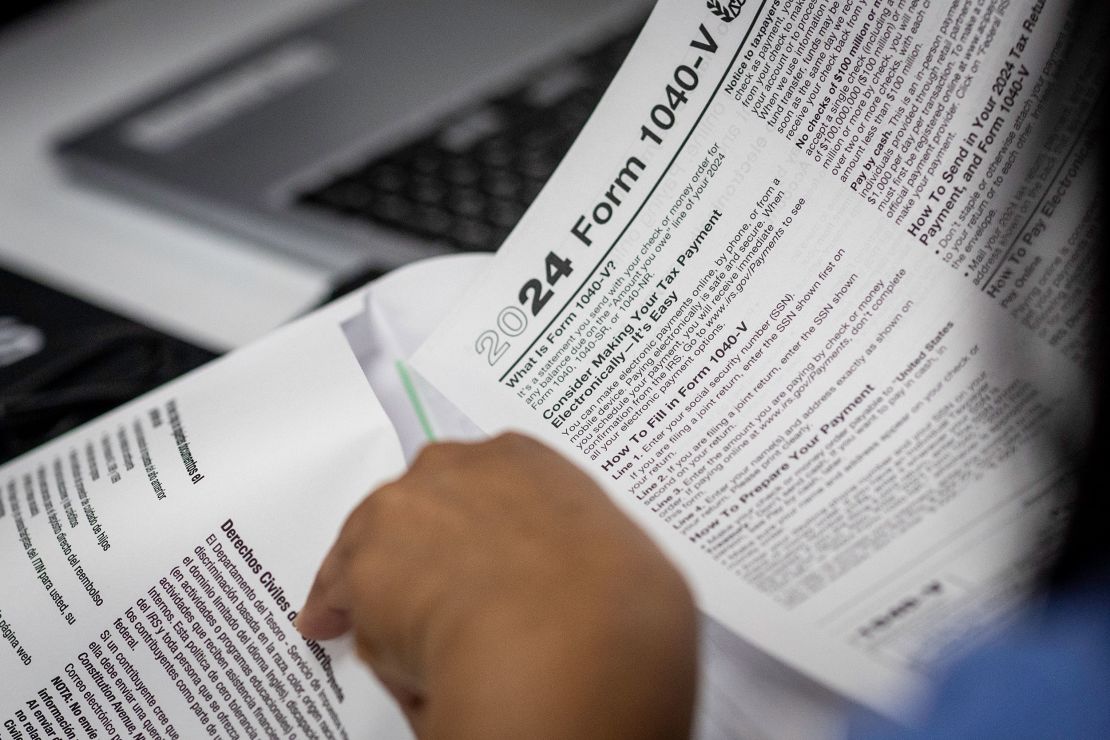CNN
—
They said no, over and over again.
Career officials at the Internal Revenue Service were pressed by Trump officials and DOGE staffers to hand over access to sensitive taxpayer data to immigration agencies, but repeatedly refused, telling their new overseers that doing so would be illegal.
The chief privacy officer told the agency’s acting commissioner in late February that “there is no clear legal authority right now for this,” according to a source with knowledge of the conversation. Another senior IRS career official told colleagues, “This doesn’t sound quite kosher to me,” according to the source.
But President Donald Trump’s political appointees and staff from Elon Musk’s Department of Government Efficiency barreled ahead. Their initial effort to collect home addresses of suspected undocumented immigrants was blocked by career officials in February, but they tried again in March, and closed the deal during a frenetic final push this month.
Along the way, they demoted IRS legal advisers who raised concerns, sidelined senior IT staffers who could’ve stood in the way, and worked in a silo to finalize the agency’s unprecedented data-sharing agreement with Immigration and Customs Enforcement that was announced last week, according to interviews with more than a dozen people with direct knowledge of situation, as well as emails and documents reviewed by CNN.
“It felt like a hostile takeover,” said one former IRS employee who recently left the agency. “If we would have imagined some foreign government sending in adversaries to take us over, this is what it would have felt like.”
Two months after the first DOGE envoy arrived with little warning at IRS headquarters, the federal tax collection agency has effectively been conquered by Trump and his political appointees. Its sensitive taxpayer information – among the government’s most highly protected databases – is on track to be used to locate undocumented immigrants for possible deportation.
Its workforce is bracing for sweeping layoffs and some of its most senior career officials have left, having either been fired, quit in protest, or taken buyouts as part of the administration’s deferred resignation program.
Now, as Americans file their taxes before Tuesday’s deadline, questions are swirling around the future of the agency that collects nearly all federal revenue. The deal with ICE helped spur an ongoing exodus of seasoned career officials – including the acting commissioner, the agency’s third leader this year. Meanwhile, the Senate seems in no hurry to schedule a hearing for Trump’s pick to run the IRS, Republican former congressman Billy Long of Missouri.
“It’s hard to think of anything positive that will come from the amount of uncertainty and turbulence at the IRS right now,” former IRS commissioner Danny Werfel, who quit on Trump’s first day instead of getting fired, told CNN. “I see confidence eroding right now.”
The story of how a group of career IRS officials tried but ultimately failed to keep DOGE at bay reveals how Musk’s allies overpowered parts of the federal bureaucracy to quickly implement one of the most controversial pillars of Trump’s agenda – essentially by never taking no for an answer.
Multiple sources inside the IRS told CNN that tensions are extremely high and that the agency is in disarray as it prepares for an imminent round of mass layoffs that could cut as much as 20% of its roughly 100,000 workers.
Even as tax season progresses without major hiccups for most taxpayers and businesses, the internal tumult inside IRS couldn’t come at a worse time in the calendar, right around Tax Day.
“It’s like going into your final practice before the Super Bowl and then telling the players and staff that they’ll get texts during the practice about whether they’re fired or not,” a senior IRS official said. “And whether you win or lose the big game, more people will then be fired.”

The Internal Revenue Service has agreed to share taxpayer data with immigration officials
Asked about the decision of several high-ranking IRS officials to leave in the wake of the data-sharing deal with ICE, White House spokesman Harrison Fields said, “Those that are not willing to support the president’s agenda and common-sense reform to government, don’t let the door hit you on the way out.”
Asked about the potential that this new policy could cost the government billions in lost revenue from undocumented taxpayers, Fields suggested it was a worthy tradeoff.
“You cannot compare the loss of tax revenue to the yearly cost endured by keeping them here,” Fields said.
In response to detailed inquiries from CNN, a Treasury Department spokesperson responded with the same prepared statement they issued last week while announcing the IRS-ICE deal. It said the interagency agreement was “founded in longstanding authorities granted by Congress, which serve to protect the privacy of law-abiding Americans while streamlining the ability to pursue criminals.”
Within days of DOGE first arriving at the IRS, the administration pressed for access to the agency’s highly confidential taxpayer data to boost its immigration agenda.
One of the first asks went to the IRS’ criminal investigation division, which surprised some officials, who expected a request like this to go through the chief privacy officer, Kathleen Walters. Officials from the Department of Homeland Security, which includes ICE, wanted home addresses for 700,000 possible undocumented immigrants that they believed already had removal orders.
Then-acting IRS commissioner Doug O’Donnell, a four-decade veteran of the agency seen as a privacy stalwart with nearly unmatched expertise, shut down the effort.
“When they brought it up with him, he said, ‘Absolutely not, that’s not what we do here,’” the former IRS employee told CNN about O’Donnell’s pushback to the proposal.
O’Donnell’s opposition was backed up by IRS lawyers as well as Walters, who immediately questioned the legality of the proposal. The federal tax code has strict limits on when taxpayers’ personal information can be shared, what types of data can be shared, and when a court order is required.

Some top IRS officials believed the issue was settled once O’Donnell put his foot down in mid-February.
Among them was Melanie Krause, who at the time was the agency’s chief operating officer. Krause sent an email on February 18 saying, “Closing the loop that this has been resolved.”
A few days later though, O’Donnell retired.
One person familiar with the matter said O’Donnell’s retirement was “sudden and unexpected.”
Krause became acting commissioner after O’Donnell’s exit. She had spent a decade in federal government oversight roles, but was a relative IRS newbie, having joined in 2021.
Just one hour into Krause’s tenure atop the agency, the issue of data-sharing resurfaced.
There was a flurry of emails on her first day, February 28, again asking to give ICE the data on 700,000 suspected undocumented immigrants that they were denied access to just days earlier, according to documents reviewed by CNN.
This spurred a wave of panic in the IRS privacy division. But a source familiar with the situation said Krause wanted to see what could be done to make it work, while complying with the law.
Again, career privacy experts raised the alarm. Walters, the privacy chief, and IRS Chief Risk Officer Mike Wetklow said the plan posed significant legal problems, the person added.
Though the data remained outside of ICE’s hands, the continued back and forth led to a significant amount of stress for a number of IRS employees, sources said. Around this time, the Trump administration also proposed cutting 20% of IRS staffers, and press reports in early March indicated that the final number could end up closer to half of the agency’s total workforce.
This all led to what some sources said was a loss of confidence in Krause’s ability to protect the agency and its workforce from what many felt were blatantly unlawful requests.
One former senior IRS official told CNN Krause was “intellectually brilliant” and “a passionate civil servant,” but that she was outmaneuvered by the new administration. Krause did not respond to CNN’s request for comment.
By mid-March, the IRS’ acting general counsel, a career official named Bill Paul, was demoted and replaced with a DOGE ally, Andrew De Mello.
“This was a big moment,” one source familiar with internal maneuvering at the agency said. “Bill was raising questions about the data-sharing agreement. They replaced him, not with the person who reported underneath him. Instead, they went deeper into the organization to find someone that they knew from Trump’s first administration. They locked in someone who would be more agreeable.”
Trump allies at the IRS started boxing out more and more career officials who, one source familiar with the situation, referred to as “blockers .” As Walters continued to object, she and her privacy team got shut out of the process.
“Kathleen was removed from the room of decision-making,” a person familiar with the situation told CNN, adding that Walters “wasn’t invited to as many of the meetings” after sending long emails with concerns.
At least one government lawyer brought in to help draft the final agreement was instructed not to share it with their boss in the IRS general counsel’s office, one of the sources said.
There was a sudden urgency in April, as the IRS neared the peak of its busiest season.
De Mello, the new DOGE-aligned general counsel, sent an email on April 2 to several top IRS officials – including Krause, who was ostensibly his boss – telling them they “cannot wait” much longer on the ICE deal because Treasury Secretary Scott Bessent and others “need this finalized and executed immediately,” according to an email reviewed by CNN.
At De Mello’s behest, Walters and others attended a video chat with DHS officials who stunned the room with news that they might seek data on as many as 7 million suspected undocumented immigrants, CNN previously reported. Walters asked to see the draft data-sharing deal before the meeting and “was given it cold,” a source said.
At some point, Walters refused to sign the agreement, because she wasn’t involved in the drafting and “she thought it was not legal,” another source said.
With Walters still refusing to sign it, De Mello went up the chain of command and asked other career IRS officials to sign, two sources said. But multiple officials said no, CNN has reported, so Bessent ended up signing it. Homeland Security Secretary Kristi Noem signed for DHS.
On the night of April 7, shortly after 11 p.m. the Trump administration revealed in a court filing that the agreement had been signed. Fox News published an “exclusive” story within an hour. Krause learned that the deal had been finalized from the news coverage, CNN has reported. By the end of that workday, Krause told her staff that she was planning to resign.
Many career officials, former officials like the ex-commissioner Werfel, and legal experts have raised concerns that agreement goes beyond what is permitted in the tax code for sharing sensitive data outside of the IRS. Immigrant rights groups filed a lawsuit in early March, hoping to block any improper data-sharing between the agencies.
“If I was sitting there as IRS commissioner, it would really take my general counsel a lot to convince me to sign it, because there is no explicit language allowing this exception,” Werfel said in an interview.

The data-sharing deal triggered a full-blown staff exodus among IRS leadership.
As the deal was hammered out, and in the wake of its finalization, several key officials with decades of combined experience announced their intent to resign.
In addition to Krause, the chief financial officer, the chief risk officer, the chief information officer, the agency’s chief of staff and Walters, the chief privacy officer, are all leaving. And the chief HR officer was placed on leave after clashing with DOGE staff earlier this year.
“It’s pretty much a bloodbath,” a former senior IRS official told CNN.
“These are all great people, passionate civil servants who were asking the right questions,” another former senior IRS official said about the mass resignations. “Taxpayers should be happy that these questions were being asked and that they were raising significant concerns.”
The chaos at the IRS, has also spurred a crisis for undocumented immigrants who are already on high alert amid Trump’s deportation push.
“Our clients are freaking out,” immigration lawyer Neil Weinrib said in an interview. “In the 40 years that I’ve been practicing immigration law, I’ve never seen anything like this. It’s roiling our clients globally. It’s having a tremendous chilling effect on foreign nationals who are in the United States.”

Weinrib showed CNN snippets of frantic emails he received from clients. One message from an Indian national said, “What is this news with the IRS? … IRS head will share all informations (sic) with DHS? … If my wife gets caught with my son, what should she do?”
At least one effort is underway to block the data-sharing deal. Two immigrant rights groups filed a lawsuit last month, and a hearing is scheduled for Wednesday in DC federal court.
The immigrant groups claim federal law clearly requires a court order before the IRS can provide taxpayer data to another agency “exclusively for use in locating” an individual. They also claim the Trump administration is trying to stretch a provision of the tax code, which allows data-sharing for individual criminal probes, into a bulk collection program.
Justice Department lawyers have argued that the program “is lawful.”
“The American people need to be confident in the fact that their personal privacy will be protected and that this will be a targeted agreement that will go specifically after individuals who do perpetuate violence and enact crimes in this country,” Noem said last week, even though the data-sharing isn’t restricted to only targeting violent criminals.
For generations, undocumented immigrants and other non-citizens have been encouraged to come forward, register with the IRS, and pay their taxes. Some have even used this to boost their attempts to secure legal status, as it demonstrates their good-faith behavior.
“This shift contradicts years of best practice that encourages all responsible individuals in the United States to file taxes, regardless of immigration status,” Cornell University professor Shannon Gleeson, who studies immigrant workers’ rights, said in an email.

The policy of guaranteeing confidentiality for undocumented taxpayers fills government coffers, too – to spend on programs like Social Security and federally funded infrastructure projects. The left-leaning Institute on Taxation and Economic Policy estimates that undocumented immigrants paid more than $96 billion in federal and state taxes in 2022.
The Budget Lab, a nonpartisan research center at Yale University, estimated that the federal government could see a $300 billion revenue drop over the next decade because of the new policy. CNN recently reported that some tax experts have noticed that undocumented immigrants are hesitant to file their taxes this year, out of fear of possible deportation.
“Losses could be more – and not just with undocumented population – as this action, along with many others, make people more nervous about sharing data with the IRS and skeptical of the tax system writ large,” tweeted Natasha Sarin, a Yale Law School professor who runs the research lab and previously served in the Biden-era Treasury Department.
